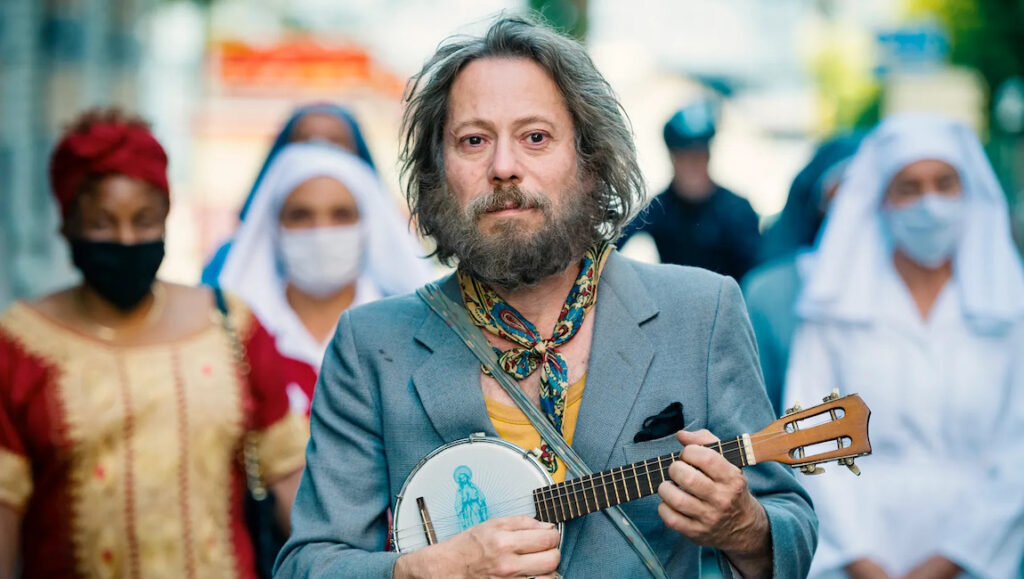From Nouvelle Vague filmmakers like Jacques Demy, Jacques Rivette, and Alain Resnais to a contemporary auteur such as Bruno Dumont, or even the more mainstream-friendly work of Christophe Honoré, French cinema has never been a stranger to the musical. In fact, most of these filmmakers, according to their own singular and ornery styles, have experimented with different aspects and elements of the genre, even to the heights of absolute deconstruction. And despite Leos Carax’s Annette (in collaboration with Sparks) positioning itself as one of the main attractions of the year, it’s not the only French musical production coming out of the 74th edition of the Cannes Film Festival. Arnaud & Jean-Marie Larrieu’s Tralala also attempts to stake out territory within this once-popular genre, and it pretty obviously intends to mess with every basic constituent of both the form and the viewers’ expectations in a most peculiar and subversive manner. The film follows its eponymous character, Tralala (Mathieu Amalric), a Christ-like Parisian hobo busker replete with shaggy grey hair, a scraggly beard, and a generally haggard appearance. He roams freely through the city’s streets, playing his electric guitar and singing his quirkily amateurish and cheesy songs, and Tralala too adopts this jaunty mood and blithe spirit. Early on, in the film’s first part — this before the modern-day troubadour unexpectedly runs into a young, lovely woman named Virginie (Galatéa Bellugi) during one strange evening, and also before he heads to Lourdes (the Pyrenean hometown of the directorial duo, and a major site of Roman Catholic pilgrimage and of miraculous healings, where the Virgin Mary even appeared to Saint Bernadette, according to believers) — the film revels in a certain kinetic rhythm and flaneurial quality, as Tralala is seen almost constantly on the move.
After that, Tralala soon finds himself in the bewitching streets of Lourdes — its charm and grace perfectly captured through the Larrieus’ crystalline and very slick imagery — in search of his dreamy muse/Madonna. Later, the homeless musician is mistakenly welcomed as the revenant dead son of a hotel matron (Josiane Balasko), and in this misunderstanding he discovers a sense of belonging, being respected and cherished, and also gains a new family of his own — a hunky brother (Bertrand Belin), two goofy rapper nephews, and even a pair of old-flame lovers (played by Mélanie Thierry and Maïwenn), among others (including the cameo presence of Denis Lavant, as Tralala’s bully rival busker). As a result, the film’s pacing, much like its imposter protagonist, becomes more grounded in the easy leisure of the film’s time and place, and it leads to more staging-oriented, choreographed scenes. But despite all of this, the film still functions more deliberately as a plotless stream of random encounters, events, and situations. Indeed, more than anything else, Tralala is perhaps most comparable to an unusual visual album, and as such, the Larrieu brothers’ film can be most appreciated as an unabashed, absurdist madcap satire, or even one of the craziest, cringiest comedies one can dream up, at least in recent years (the closest, quickest comparisons that jump to mind are Dumont’s recent musicals), its odd physical appearances, frequent subtle gestures, and the awkward, sudden pauses of the performers of immediate importance. It’s evident that Tralala strives for a mix of both offbeat and upbeat traits, sketches, and ideas, its bold take ensuring that these bits can frequently, repetitively fall flat, but can just as quickly rebound into exciting, mirthful, or even heartfelt moments.
Filled as much with head-scratching religious and metaphysical symbolism as it is obvious reference to our social condition in proximity to the catastrophic Covid-era — as we see, masked passersby are everywhere — what gives Tralala its unique, beguiling quality, then, is the way it’s gilded in the generic, fictional glamour of classical musicals, and yet still succeeds in handling its more documentary dimensions. But if there’s anything that can be easily intuited in this guerrilla-style musical, it lies in the broader existential and identity-related crises of our time that the Larrieu brothers, even if ultra-ironically, illuminate; that very meta-condition of constant role-shifting wherein the individual can be utterly stripped of authentic identity, to the point even of possessing no real name. The film acknowledges the preordainment to keep on living, even if in the most chaotic and hilariously meaningless contexts, ones that can seem to be excessively governed by ecclesiastical and capitalistic discourses. Put differently, Tralala is a situational comedy about both the necessities and inevitabilities of tuning oneself into the most out-of-tune conditions and circumstances. It’s no surprise then that during their first encounter, Virginie admonishes Tralala: “Above all, do not be yourself.” While, speaking of the film itself, as fanciful and schismatic as it is, the Larrieu brothers, in stark contrast to this early advice, unapologetically stick to what they do best: being 100% themselves.
Published as part of Cannes Film Festival 2021 — Dispatch 5.


Comments are closed.